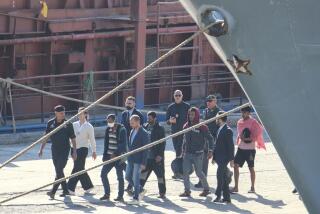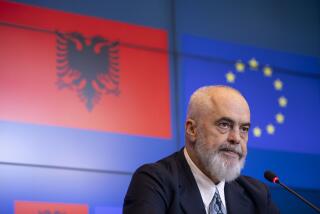EUROPE : Long-Isolated Albania Fights Infectious-Disease ‘Imports’
- Share via
TIRANA, Albania — When this Rip Van Winkle country opened its doors to the outside world four years ago, few of those who had been locked away for half a century expected the first major foreign influx to be infectious disease.
But among the first “imports” to Albania in the post-Stalinist era have been cholera, syphilis, hepatitis-B and AIDS.
Ignorance and poor hygiene have conspired to expose this long-isolated country to a degree of pestilence unseen on this continent since early this century.
“I wouldn’t be surprised to learn tomorrow that we also have an outbreak of malaria,” said Vladimir Gusmari, head of the World Health Organization office. “All of the conditions are there.”
As witnessed during a recent cholera epidemic, the worst in Europe for decades with more than 1,000 infected and at least 14 dead, Albania is virgin territory for infectious diseases.
Less than half of the population lives in homes with indoor plumbing. Wanton disregard for the environment during the 41-year dictatorship of the late Enver Hoxha left Albania strewn with piles of garbage and pools of raw sewage, ready breeding grounds for germ-carrying rodents and insects.
With industry at a standstill after chaotic change in the political system, the money propping up this country comes mostly from 500,000 workers who slip illegally into Greece and Italy.
That migrant work force is believed to be the source of the sudden emergence of AIDS in this country, with 10 HIV-positive cases identified in less than a year and three Albanians already sick with the virus.
“The question of AIDS for Albania is not one of if, but when,” said the local UNICEF director, Alireza Mahallati. “The cases we’ve identified so far are just the tip of the iceberg. . . . This country had no sex education of any shape or kind and still doesn’t.”
The majority of migrant workers are males in the prime of their reproductive years, Mahallati said. Many become sexually involved while abroad with high-risk partners, such as prostitutes and drug users, then pass on diseases to wives or girlfriends when they return home.
Albanian health officials say they are getting help in combatting infectious disease from international agencies, as well as from neighboring countries that fear Albania’s plagues could spread.
The International Rotary Club has been bankrolling immunization against childhood diseases, and when the first cholera cases emerged in late summer, Italy quickly dispatched specialists and tankers of chlorine.
With the help of foreign agencies, Albania has also embarked on a massive AIDS awareness campaign.
Because Hoxha espoused strong pro-natal policies in an unbridled quest to build up the army, birth control and abortion were banned here until the hard-line Communists were ousted in late 1990.
Contraceptives are now available, but the costs are prohibitive, and few rural Albanians understand much about their use.
At a shantytown just outside Tirana where thousands fleeing worse poverty in the countryside have taken up residence in squalid shacks and abandoned bunkers, the hazardous future is there to see.
Arben Jata, an 18-year-old tending his family’s sheep, said he had heard of acquired immune deficiency syndrome and claimed to understand how it is spread. But when asked whether condoms were available, he said he had no idea what they were.
One hope for Albania is the gritty determination of its 3.3 million people to catch up to European living standards.
Unlike other post-Communist societies, for example, in which people tend to spend their first earnings on a car, Albanians are investing in modern plumbing.
Vasil Stefani is one of hundreds of construction workers in Tirana who cannot keep up with the demand for new bathrooms and kitchens. Even at the equivalent of $1,500 for a sink, toilet and tub ensemble, Stefani said he has to turn customers away.
Amused by Albanians’ newfound fixation with hygiene, Stefani observed, “It seems Albania is trying to enter Europe through the bathroom.”
More to Read
Sign up for Essential California
The most important California stories and recommendations in your inbox every morning.
You may occasionally receive promotional content from the Los Angeles Times.














